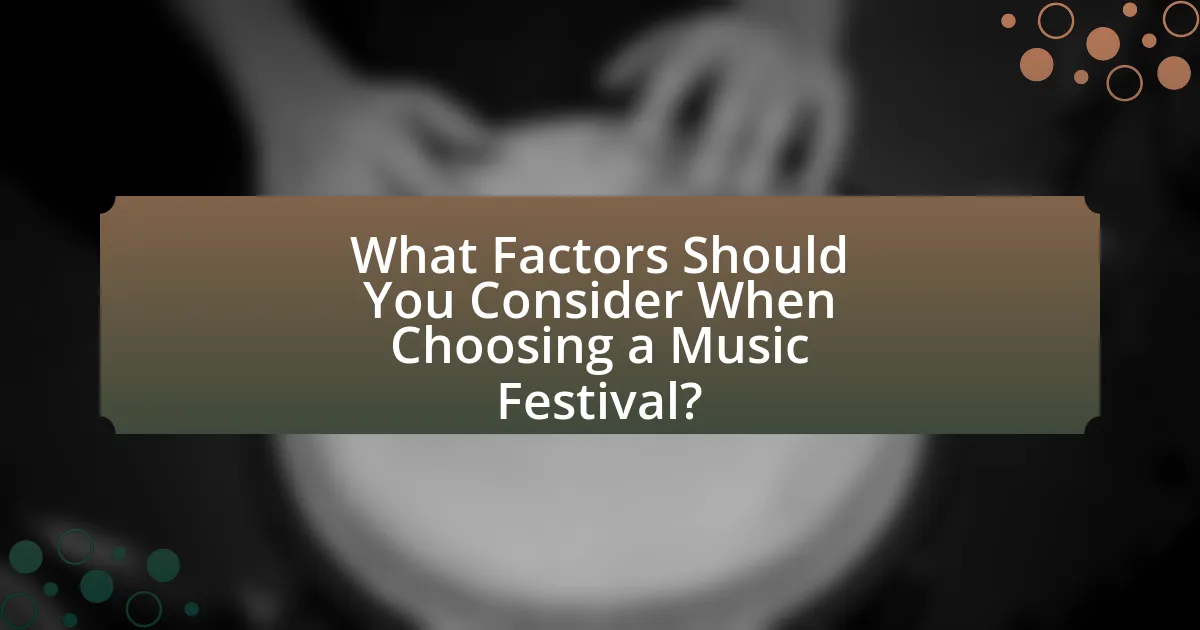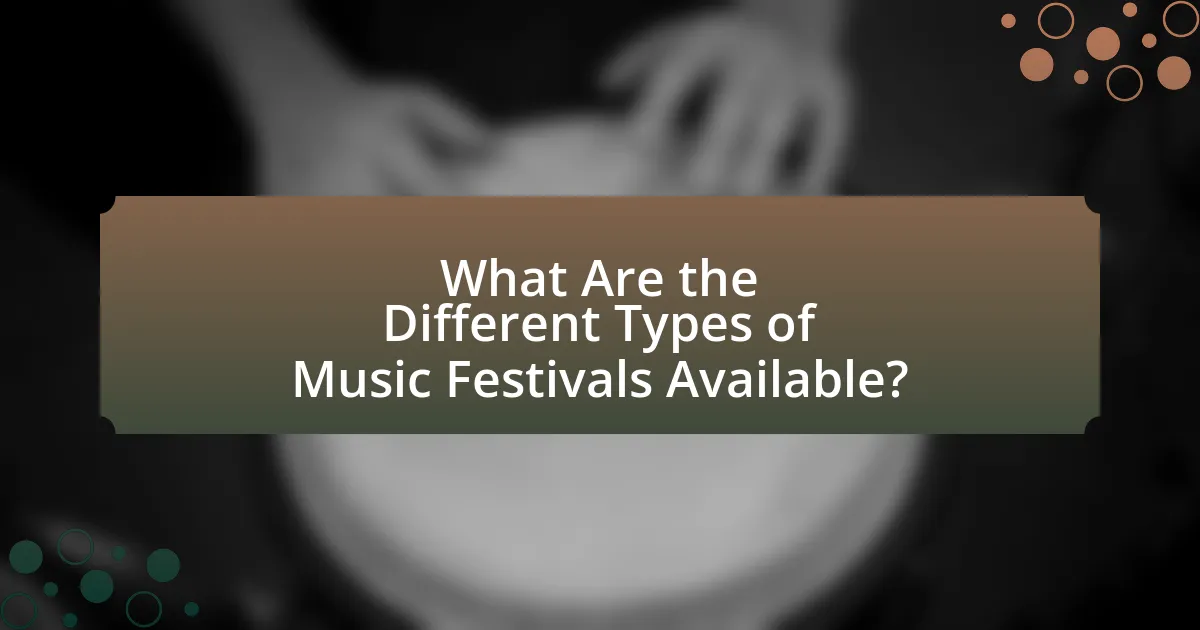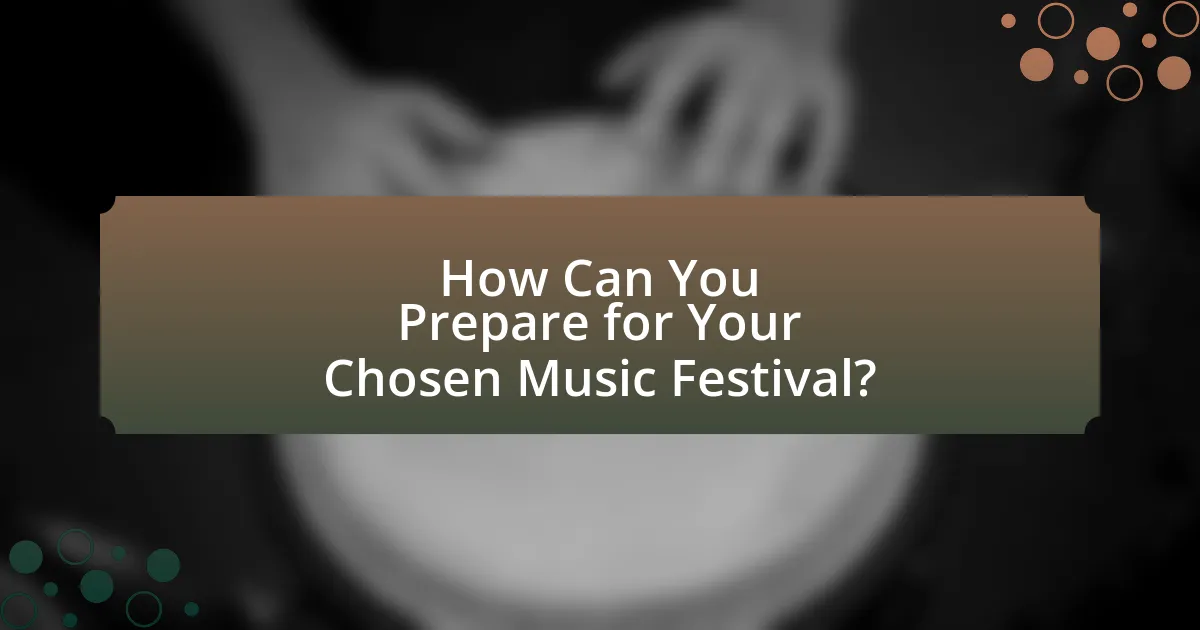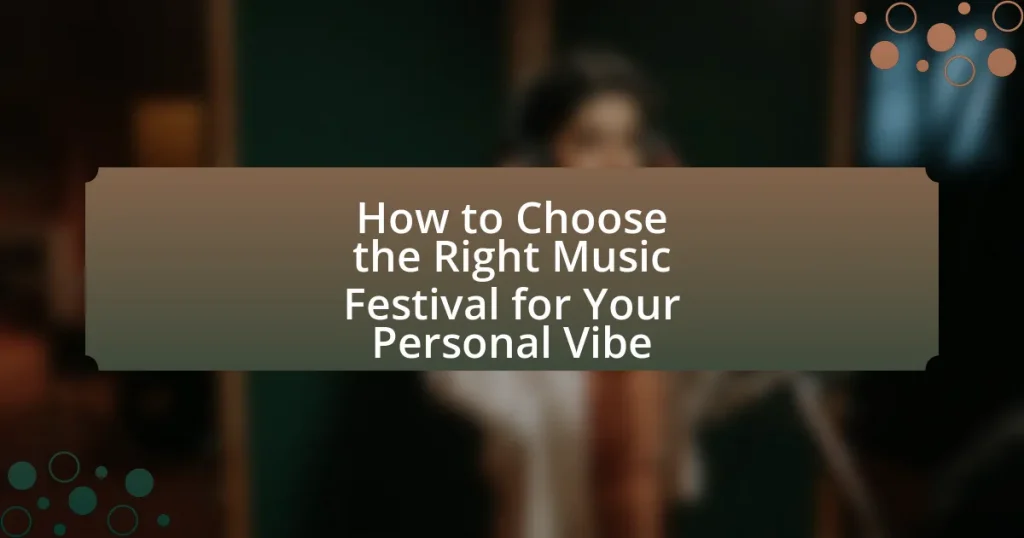The article focuses on how to choose the right music festival that aligns with personal preferences and vibes. It outlines key factors to consider, including artist lineups, festival locations, ticket prices, and the overall atmosphere. The article also discusses the influence of musical preferences on festival selection, the variety of genres represented at different festivals, and the importance of location and setting in enhancing the festival experience. Additionally, it provides practical tips for preparation, including packing essentials, planning schedules, and ensuring safety and comfort during the event.

What Factors Should You Consider When Choosing a Music Festival?
When choosing a music festival, consider the lineup of artists, location, ticket prices, and festival atmosphere. The lineup is crucial as it determines whether the music aligns with your preferences; for instance, festivals like Coachella feature a diverse range of genres, attracting various audiences. The location impacts accessibility and the overall experience; festivals in scenic areas, such as Glastonbury in the UK, enhance enjoyment. Ticket prices vary significantly, so evaluating your budget is essential; for example, some festivals offer tiered pricing based on early purchases. Lastly, the festival atmosphere, which can range from laid-back to high-energy, influences your enjoyment; events like Burning Man are known for their unique, immersive experiences.
How do your musical preferences influence your festival choice?
Musical preferences significantly influence festival choice by determining the genres and artists featured at the event. For instance, a person who enjoys electronic dance music is likely to attend festivals like Tomorrowland or Electric Daisy Carnival, which prominently feature DJs and electronic acts. This alignment between personal taste and festival lineup ensures a more enjoyable experience, as attendees are more likely to connect with the music and atmosphere. Research indicates that 70% of festival-goers choose events based on the lineup, highlighting the direct correlation between musical preferences and festival selection.
What genres are represented at different festivals?
Different festivals represent a wide array of music genres, including rock, pop, electronic, hip-hop, country, jazz, and folk. For instance, Coachella primarily showcases rock and pop artists, while Tomorrowland focuses on electronic dance music. The Newport Jazz Festival is dedicated to jazz, and Stagecoach highlights country music. These genre-specific festivals cater to diverse musical tastes, allowing attendees to choose events that align with their personal preferences.
How can you discover new artists at festivals?
You can discover new artists at festivals by exploring diverse stages, attending lesser-known acts, and engaging with festival lineups and schedules. Festivals often feature multiple stages with various genres, allowing attendees to stumble upon emerging talent. Additionally, checking social media platforms and festival apps can provide insights into up-and-coming artists performing at the event. According to a 2022 survey by Eventbrite, 70% of festival-goers reported discovering new artists through live performances, highlighting the effectiveness of this approach.
What role does location play in selecting a music festival?
Location is a critical factor in selecting a music festival as it influences accessibility, atmosphere, and overall experience. Festivals situated in urban areas often provide easier transportation options and nearby accommodations, while those in scenic or remote locations can enhance the ambiance and create a unique vibe. For instance, festivals like Coachella in California benefit from their proximity to major cities, attracting larger crowds, whereas events like Glastonbury in the English countryside offer a distinct rural charm that appeals to specific audiences. The geographical setting also affects the festival’s weather conditions, which can impact attendance and enjoyment.
How does the festival’s setting affect the overall experience?
The festival’s setting significantly enhances the overall experience by influencing the atmosphere, accessibility, and engagement of attendees. A scenic location, such as a beach or a forest, can create a more immersive and enjoyable environment, fostering a deeper connection to the music and community. For instance, festivals held in picturesque landscapes often attract larger crowds and generate positive emotional responses, as evidenced by studies showing that natural settings can enhance mood and social interactions. Additionally, the proximity of amenities and transportation options within the setting can affect convenience and comfort, further impacting attendees’ enjoyment and participation.
What are the travel considerations for attending a festival?
Travel considerations for attending a festival include transportation options, accommodation arrangements, and local regulations. Attendees should evaluate the best modes of transport, such as driving, flying, or public transit, based on distance and convenience. Booking accommodations in advance is crucial, as nearby hotels and campsites can fill up quickly, especially for popular festivals. Additionally, understanding local laws regarding noise, alcohol consumption, and camping can prevent legal issues during the event. These factors collectively ensure a smooth and enjoyable festival experience.
How important is the festival atmosphere to your experience?
The festival atmosphere is crucial to the overall experience, as it significantly enhances enjoyment and engagement. A vibrant atmosphere, characterized by elements such as music, art, and community interaction, creates an immersive environment that fosters emotional connections and memorable moments. Research indicates that 78% of festival-goers report that the atmosphere directly influences their satisfaction and likelihood of returning to the event, highlighting its importance in shaping the overall experience.
What types of vibes can you expect at different festivals?
Different festivals offer distinct vibes that cater to various preferences. For example, electronic dance music festivals like Tomorrowland create an energetic and euphoric atmosphere, characterized by vibrant light shows and a sense of community among attendees. In contrast, folk festivals such as Newport Folk Festival provide a more laid-back and intimate vibe, focusing on storytelling and acoustic performances, fostering a connection between artists and the audience. Additionally, rock festivals like Coachella often exude a trendy and eclectic atmosphere, attracting diverse crowds and showcasing a mix of established and emerging artists. These variations in vibes are influenced by the genre of music, the festival’s location, and the overall culture surrounding the event.
How can you assess the festival’s community and culture?
To assess a festival’s community and culture, analyze the demographics, values, and behaviors of attendees. Observing the diversity of participants, their interactions, and the overall atmosphere can provide insights into the festival’s cultural identity. For instance, festivals that promote inclusivity often feature a wide range of activities and performances that reflect various cultural backgrounds, which can be evidenced by the presence of different food vendors, art installations, and workshops. Additionally, reviewing social media engagement and community feedback can reveal how the festival is perceived and its impact on local culture.

What Are the Different Types of Music Festivals Available?
There are several types of music festivals available, including genre-specific festivals, multi-genre festivals, and cultural festivals. Genre-specific festivals focus on a particular music style, such as rock, jazz, or electronic dance music, attracting fans of that genre. Multi-genre festivals feature a diverse lineup of artists across various genres, appealing to a broader audience. Cultural festivals often incorporate music as part of a larger celebration of cultural heritage, showcasing traditional music alongside other art forms. These distinctions help attendees choose a festival that aligns with their musical preferences and personal vibe.
What are the major categories of music festivals?
The major categories of music festivals include genre-specific festivals, multi-genre festivals, cultural festivals, and boutique festivals. Genre-specific festivals focus on a particular music style, such as rock, electronic, or jazz, attracting fans of that genre. Multi-genre festivals feature a diverse lineup of artists across various genres, appealing to a broader audience. Cultural festivals celebrate specific cultural traditions and often incorporate music as a key element, showcasing local or international artists. Boutique festivals are smaller, often more intimate events that emphasize unique experiences and curated lineups. These categories help individuals select festivals that align with their musical preferences and personal vibes.
How do multi-genre festivals differ from genre-specific festivals?
Multi-genre festivals feature a diverse range of musical styles and artists, while genre-specific festivals focus exclusively on one particular genre. Multi-genre festivals, such as Coachella or Lollapalooza, attract a broader audience by offering various performances across genres like rock, pop, hip-hop, and electronic, thereby catering to different musical tastes within a single event. In contrast, genre-specific festivals, such as the Newport Folk Festival or Electric Daisy Carnival, create a concentrated experience for fans of a specific genre, providing a deeper immersion into that musical style. This distinction allows attendees to choose between a wider variety of experiences at multi-genre festivals or a more specialized, genre-focused atmosphere at genre-specific festivals.
What unique experiences do boutique festivals offer?
Boutique festivals offer intimate and immersive experiences that differentiate them from larger events. These festivals typically feature a smaller capacity, allowing for closer interactions between artists and attendees, fostering a sense of community. Additionally, they often emphasize unique themes, curated lineups, and artistic installations, enhancing the overall atmosphere. For instance, many boutique festivals prioritize local culture and sustainability, incorporating regional food, art, and eco-friendly practices, which enrich the attendee experience. This focus on personalization and creativity results in memorable moments that resonate with participants, making boutique festivals a distinctive choice for music lovers seeking a more engaging environment.
How do festival sizes impact your choice?
Festival sizes significantly impact choice by influencing the overall experience, atmosphere, and accessibility. Larger festivals often feature a wider variety of artists and activities, attracting diverse crowds, which can enhance social interactions and networking opportunities. Conversely, smaller festivals typically offer a more intimate setting, allowing for closer connections with performers and fellow attendees. According to a study by the Event Marketing Institute, 78% of festival-goers prefer smaller events for their personalized experiences and community feel. This data underscores how festival size can dictate not only the type of experience one seeks but also the social dynamics involved.
What are the pros and cons of attending large vs. small festivals?
Attending large festivals offers the advantage of diverse lineups and extensive amenities, while small festivals provide a more intimate atmosphere and closer artist interactions. Large festivals, such as Coachella, typically feature numerous high-profile acts, attracting larger crowds and offering a variety of experiences, but they can also lead to overcrowding and higher costs. In contrast, small festivals often foster a sense of community and allow for easier access to performers, but they may have limited options in terms of artists and activities. For example, smaller festivals like Newport Folk Festival emphasize local talent and create a unique, personal experience, though they might lack the scale and variety of larger events.
How does crowd size affect your enjoyment of the festival?
Crowd size significantly impacts enjoyment at a festival by influencing personal space, accessibility, and overall atmosphere. A larger crowd can create an energetic environment, enhancing excitement and engagement, but it may also lead to discomfort due to overcrowding, making it difficult to navigate or enjoy performances. Conversely, a smaller crowd often allows for a more intimate experience, fostering connections with artists and fellow attendees, but may lack the vibrant energy that larger gatherings provide. Studies indicate that 70% of festival-goers prefer moderate crowd sizes for optimal enjoyment, balancing energy and personal comfort.

How Can You Prepare for Your Chosen Music Festival?
To prepare for your chosen music festival, start by researching the festival’s lineup, schedule, and location. Understanding the artists performing allows you to prioritize which acts to see and plan your time effectively. Additionally, review the festival’s rules regarding items allowed on-site, such as food, drinks, and camping gear, to avoid any surprises.
Next, secure your tickets early, as many festivals sell out quickly. Consider transportation options, whether driving or using public transit, and plan your route in advance to ensure timely arrival.
Packing essentials is crucial; include items like sunscreen, comfortable clothing, hydration packs, and portable phone chargers. According to a survey by Eventbrite, 70% of festival-goers emphasize the importance of staying hydrated and protected from the sun.
Lastly, connect with fellow attendees through social media or festival forums to share tips and experiences, enhancing your overall festival experience.
What essentials should you pack for a music festival?
To pack for a music festival, essential items include a tent for shelter, sleeping bag for comfort, portable charger for devices, water bottle for hydration, and sunscreen for skin protection. These items ensure a comfortable and enjoyable experience while attending the festival. According to the American Camping Association, having proper gear significantly enhances outdoor experiences, making these essentials crucial for festival-goers.
How can you ensure you have the right gear for comfort?
To ensure you have the right gear for comfort, assess your specific needs based on the festival environment and activities. This involves selecting clothing that is appropriate for the weather, such as breathable fabrics for hot conditions or waterproof options for rain. Additionally, consider footwear that provides adequate support for long periods of standing or walking, as comfort is crucial for enjoying the festival experience. Research indicates that wearing the right gear can significantly enhance overall enjoyment and reduce fatigue, as supported by a study from the Journal of Outdoor Recreation and Tourism, which highlights the importance of appropriate attire in outdoor events.
What items are often overlooked but necessary for festival-goers?
Festival-goers often overlook items such as portable phone chargers, hydration packs, and earplugs, which are essential for an enjoyable experience. Portable phone chargers ensure that attendees can stay connected and capture memories without worrying about battery life, as many festivals can last several hours. Hydration packs allow for easy access to water, helping to prevent dehydration in crowded and hot environments, which is crucial given that studies show dehydration can lead to fatigue and decreased enjoyment. Earplugs protect hearing from loud music, reducing the risk of long-term damage while still allowing attendees to enjoy the performances. These items enhance comfort and safety, making them necessary for a successful festival experience.
How can you plan your festival schedule effectively?
To plan your festival schedule effectively, prioritize the artists and events you want to see by creating a list based on your preferences. This method allows you to allocate time slots for each performance, ensuring you do not miss your favorite acts. Additionally, consider the festival layout and travel time between stages, as this will help you manage your schedule more efficiently. Researching set times in advance and using festival apps can provide real-time updates and alerts, further enhancing your planning. By organizing your schedule around key performances and logistical considerations, you can maximize your festival experience.
What strategies can help you prioritize performances?
To prioritize performances at music festivals, attendees should create a schedule based on personal preferences and set clear priorities for must-see artists. This involves researching the lineup in advance, identifying key performances that align with individual music tastes, and allocating time for each act. According to a survey by Eventbrite, 70% of festival-goers plan their schedules ahead of time to maximize their experience, demonstrating that pre-planning significantly enhances enjoyment and ensures that attendees do not miss their favorite acts.
How can you balance exploring the festival with attending shows?
To balance exploring the festival with attending shows, prioritize your schedule by selecting key performances and allocating specific time slots for exploration. This approach allows you to enjoy both the music and the festival atmosphere. For instance, if a show starts at 6 PM, plan to explore the festival grounds before that time, ensuring you have ample opportunity to discover food vendors, art installations, and other attractions. Additionally, use festival apps or schedules to identify must-see acts and map out your exploration route efficiently, maximizing your experience without missing important performances.
What tips can enhance your overall festival experience?
To enhance your overall festival experience, prioritize planning and preparation. Research the festival lineup, schedule, and venue layout to maximize enjoyment and minimize stress. For instance, knowing the set times of your favorite artists allows you to plan your day effectively, ensuring you don’t miss performances. Additionally, staying hydrated and wearing comfortable clothing can significantly improve your physical comfort, which is crucial for enjoying long hours of music and activities. According to a study by the University of California, staying hydrated can enhance cognitive function and mood, both of which are essential for a positive festival experience.
How can you connect with other festival-goers?
To connect with other festival-goers, actively engage in social activities and utilize festival-specific platforms. Participating in group activities, such as workshops or communal spaces, fosters interaction. Additionally, many festivals offer mobile apps or social media groups where attendees can share experiences and meet others. Research indicates that social interactions at festivals enhance the overall experience, as seen in studies highlighting the importance of community in event settings.
What are some best practices for staying safe and healthy at festivals?
To stay safe and healthy at festivals, individuals should prioritize hydration, sun protection, and awareness of their surroundings. Hydration is crucial; studies show that dehydration can lead to fatigue and heat-related illnesses, so drinking water regularly is essential. Sun protection, including wearing sunscreen and protective clothing, helps prevent sunburn and heat exhaustion, which are common at outdoor events. Additionally, being aware of one’s surroundings and staying with friends can enhance personal safety, as reported by safety organizations that emphasize the importance of vigilance in crowded environments.
